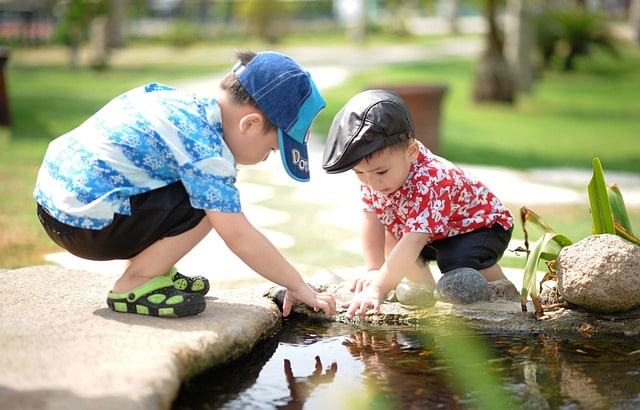
☕ Welcome to the Magic of Solo Play
In a fast-paced world of enrichment classes, apps, and endless stimulation, one of the most powerful tools for your child’s development is incredibly simple (and screen-free): independent play.
From discovering toes to building imaginary kingdoms, kids aged 0 to 4 thrive when they learn to entertain themselves—and you’ll love the calm it brings to your home.
🤔 What is Independent Play?
Independent play is when babies, toddlers, or preschoolers engage with toys or activities on their own, without adult direction. You’re nearby for safety, but they’re the leaders—exploring, imagining, solving, creating.
💡 Why Is Independent Play So Important?
Solo play is more than just a break for parents (although, yes, coffee time!). It’s a foundational learning tool that helps shape confident, creative, and focused children.
✅ Top Benefits of Independent Play:
- Boosts attention span and self-regulation
- Fuels creativity and open-ended thinking
- Builds confidence in problem-solving
- Teaches patience, resilience, and delayed gratification
- Promotes decision-making and autonomy
🧠 “Play is not a break from learning. It is the way young children learn.”
— Dr. Maria Montessori
⏱️ How Long Should Kids Play Alone?
Start small and build up. The more you practice, the more they’ll thrive in solo time!
| Age Range | Recommended Solo Play Time |
|---|---|
| 6–12 months | 5–10 minutes |
| 1–2 years | 10–20 minutes |
| 2–3 years | 20–30 minutes |
| 3–4 years | 30–60 minutes |
🗂️ [Free Download] 7-Day Independent Play Challenge
🎉 Build solo play into your routine with this done-for-you printable:
- Age-appropriate activities
- Daily progress tracker
- Easy, low-prep ideas
📥 Download the Challenge JPEG
🧩 How to Encourage Independent Play (By Age)
👶 Babies (0–12 months)
Try:
Tips:
- Use a clean, cozy floor space
- Narrate gently, then back off slowly
- Keep it short and stimulating
🚼 Toddlers (1–2 years)
Try:
Tips:
- Offer “yes spaces” with limited safe toys
- Rotate toys weekly
- Stay close, but hands-off
🧒 2–3 Years
Try:
Tips:
- Themed play trays spark curiosity
- Let them play “wrong” – it’s learning!
- Set up before transitions (e.g., before dinner)
🎨 3–4 Years
Try:
Tips:
- Build “play invitations” with 2–3 objects
- Step back and observe silently
- Let them clean up with help (part of the play!)
🧸 Best Toys for Independent Play
🧠 Open-ended toys build focus and imagination. Look for minimal, multi-use items:
- ✅ Wooden blocks
- ✅ Animal figurines
- ✅ Pretend food sets
- ✅ Play dough
- ✅ Train tracks
- ✅ Dollhouses
- ✅ Art supplies like scissors, washable markers, etc.
- ✅ Sensory bins
- ✅ Cardboard boxes (seriously!)
💬 “The best toys are 90% kid, 10% toy.”
— Janet Lansbury
😬 Why Some Kids Struggle to Play Alone
Even with the best setup, some little ones resist solo play at first. Common culprits?
- 📺 Too much screen time = short attention spans
- 🎁 Too many toys = overstimulation
- 🤹 Over-intervention = learned dependency
- 😓 Fear of boredom = lack of creative trust
Give it time. Stay consistent. Let boredom bloom into creativity.
🔁 Tips for Building a Solo Play Habit
✨ These habits turn solo play into second nature:
- Start with a ritual: A song, a timer, or a phrase like “Now it’s your playtime!”
- Rotate toys weekly: Keep interest high and clutter low
- Use visual timers: Great for toddlers learning to wait
- Let them get bored: That’s where the magic happens
- Celebrate effort: “You played all by yourself for 15 minutes!”
📊 [Printable] Independent Play Tracker
Track your child’s solo play growth across the week. Add notes, goals, and celebrate each day.
📥 Download the Tracker JPEG
📌 Pin These for Later!
Want to save and share the best tips? Try making or pinning these:
- 🧠 “Independent Play by Age” chart
- 🧸 “Top 10 Toys for Kids Who Play Alone”
- 🗓️ “7-Day Independent Play Challenge” printable
📸 You can download the matching visual here: 🖼️ Infographic Poster JPEG
💬 Final Thought: Step Back and Let Them Shine
Remember: your child’s greatest growth doesn’t happen when we direct—it happens when we observe. Let them lead their play, make their mess, and invent their world.
Independent play builds brains. It builds joy. And yes—it buys you five glorious minutes for yourself.



